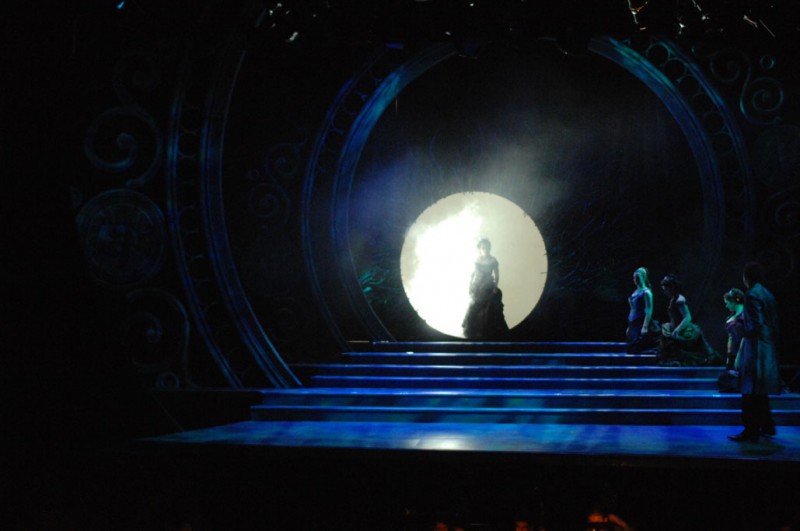(Image above: the entry of the Queen of the Night, in The Magic Flute: via David Ronis)
I was bitten very early by the opera bug.
I think this happened in fifth grade or thereabouts. Our grade school music class got shoved into a bus and ferried into New York, where we spent a day with the New York Philharmonic Orchestra and some people from the Metropolitan Opera, being shown the sights and talking to musicians and singers about what they did and how they did it. (Some of us got to actually conduct the Phil for twelve bars or so. Who cared that the orchestra was minus its second chairs? It was… quite something. …That’s another story.)
At the Met, anyway, we all got to sit down front in the expensive seats, and the chandeliers were retracted and lowered for us (which was seriously cool), and then the curtains parted and we found ourselves staring at a coloratura soprano with an afternoon to spare, standing near the top of a stepladder with a spotlight on her, wearing an amazing long glittery black dress and what appeared to be a crown of stars.
Then the conductor gave the downbeat, and the soprano opened her mouth and sang. And suddenly she was not just some singer on a stepladder but the local embodiment of Astrafiammante the Queen of the Night in all her pissed-off glory, absolutely shaking the rafters with what I know know to be one of the more difficult pieces of music in the operatic repertoire, but then simply sounded to me like a very angry angel looking for someone to deck out. I wasn’t entirely clear about the details of what she was singing then; I was way too blown away. I had never heard anything like this before. I… was… GONE.
So began what’s since become a lifelong fascination with this complex, sometimes crazy and almost always beautiful art form. I listen to opera when I’m happy or when I’m sad, and particularly when I need to force a mood shift for work’s sake. As a result, opera is rarely far from my writing: there are precious few of my books that I haven’t found a way to sneak opera into somehow (though mostly I try to be circumspect about it. You may only hear a little of the music in the background [as during Stealing the Elf-King’s Roses] or see it on stage in full view [as in Dark Mirror, with added Klingons]. But it’s usually lurking somewhere in the wings.)
The reason this comes up now is that the other day I was looking under the bed for something, and bumped into a big box of cassette tapes that Peter and I have been promising to strike to digital format for what seems like forever. There was the old tape deck, too, sitting there with that patiently aggrieved look that superannuated hardware visits upon you, having given you long and faithful service and still having been abandoned. I said “Oh, what the hell?”, pulled out the deck and the box of tapes, went through the usual frustrating search for cables with which to get the cassette deck talking to the big desktop machine’s sound card, found the cables in less than half an hour (which is in itself a small miracle around this place: other hardware geeks will know how cables both simultaneously pile up and still manage to hide themselves from you when urgently needed), did the hooking up, and started going through the box.
Oh, memories. There is nothing quite so evocative of Nostalgia For Your Lost Youth as going through old hand-made cassette mix tapes.
One tape, though, when I picked it up, jogged my memory unusually hard: because I realized already had a dub of what was on it — albeit not a great one, done some years back. And thereby hangs a tale.
Those of you who live in Los Angeles, or have National Public Radio stations near you, may (or indeed should) know of the funny, erudite and utterly melliflous music commentator named Jim Svejda (it’s pronounced SHVAY-duh), who operates out of the venerable and much-loved classical music station KUSC. Jim has has been there seemingly since dinosaurs walked the earth, running their Evening Program and just getting better and better all the time. (This goes for his voice too, which is possibly one of the reasons I like Benedict Cumberbatch’s voice so much: in some modes it reminds me strongly of Svejda’s.) I have been this man’s fan since I first heard him: he is, for this reason, probably the only member of KUSC’s staff to appear in a Star Trek novel.
For years and years Jim hosted a syndicated show called The Opera Box in which every week he shared his passion and wisdom about all things operatic (not to mention his extraordinary audio collection). Now, since KUSC is a public-supported station, which once or twice a year slows things down to run pledge drives, Jim at such times would put together unusual “special features” which would be aired a little at a time until people had called in to pledge enough money to get that particular recording rolling again.
One of these was a hysterical farrago called “Il Barbieri von Nuremberg”, a totally crazed piece of business in which Svejda cobbled together a truly Frankenstein-monsterish fake opera out of bits and pieces of operatic works both famous and obscure, constructed a beyond-wacky plot for the thing, and then supplied it with his own commentary in that lovely dark voice of his. Somehow or other I failed to get that on tape, which still drives me crazy sometimes.
But I did manage to tape the sequel that Jim did the following year (1981, I think), “Il Barbieri von Nuremburg Strikes Back.” This purports to contain excerpts of the lost bel canto opera Lucia di Liverpool, as performed by the Omsk People’s Lyric Theatre, Tractor Sales and Service.
It’s madness.
And now at last I have an MP3 of it — or what I was able to get of it, back in the day when in the middle of a live recording you had to sit there hovering over the machine waiting for the tape to run out, then break out in a sweat as you cued the flip side and started recording again. In particular — besides the numerous crazy symphonic and other musical interludes that Svejda has tucked into this thing — I direct your attention to the 25:00 minute mark (or this separate 3-minute MP3), and Jim’s truly nutso version of the famous tenor aria Di quella pira, into which he inserts the voices of at least twenty-five different tenors*, flawlessly pitch- and tempo- matched (this was way before the software that now makes such things easy: Svejda would have most likely done this with a transcription table), and which is frankly the damndest display of virtuoso scissorwork I’ve ever heard.
…So here it all is, in MP3 format. The main file is just short of an hour long (about 60 megabytes): you may or may not be able to get it to stream for you — I’d guess that will depend on your software.
One caveat: please note that the sound quality on this dub is NOT great at the very beginning, though it improves considerably after the first ten minutes. (The tape was already pushing at least twenty-five years old when I initially struck it to CD, after all, and some stretch-distortion at the ends, and a little print-through, would have been unavoidable.) The rest of the hour isn’t bad, despite the occasional hiss of FM signal drift; and now that I have better equipment, and way better audio tools, over the next couple of days I’m going to see if I can get an improved dub off the original tape.
Anyway: enjoy!
*Possibly more. I lost count.



